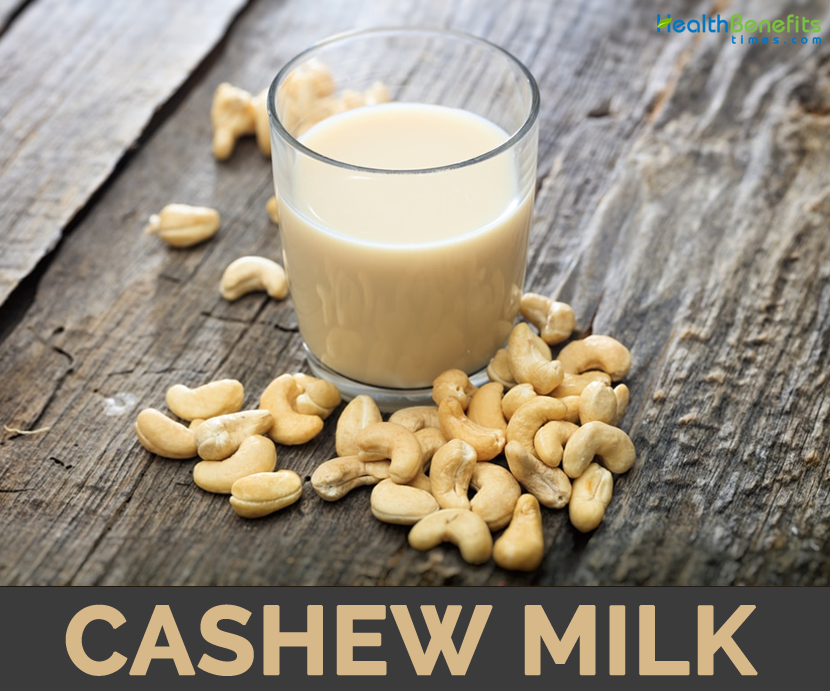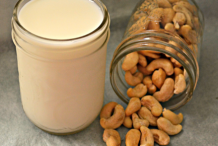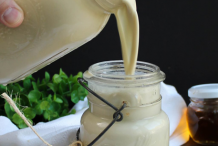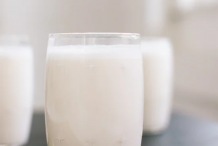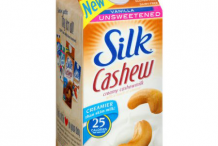| Cashew Milk Quick Facts |
| Name: |
Cashew Milk |
| Colors |
Off-white |
| Shapes |
Thick, Creamy |
| Taste |
Sweet, nutty and a little buttery taste |
| Major nutrients |
Copper (69.11%)
Total Fat (35.51%)
Phosphorus (24.00%)
Iron (23.63%)
Manganese (20.39%)
|
| Health benefits |
Healthy Skin, Healthy Bone, Good for our heart, Controls Blood Pressure, Low glycemic index, Good source of essential fatty acids, Prevents Gallstones, Treat Depression, Good for those with food sensitivities, Easy to digest |
When cashews (Anacardium occidentale) are blended with water, the result is a creamy off white liquid commonly known as cashew milk. Cashew milk is lactose-free, but the nutrients may vary according to whether you make it at home or buy a commercially prepared product. You’ll even find differences between store-bought brands because they’re fortified with varying amounts of vitamins and minerals. Cashew milk is made by soaking raw cashews in water, rinsing them off, blending them together with filtered water, and straining the pulp to achieve smooth liquid milk. Cashew milk is full of redeeming nutrients, like magnesium, phosphorus, iron, potassium and zinc. The fat in cashews is mostly unsaturated and they are a good source of protein.
When you make cashew milk at home you may add a small amount of flavorings, such as cinnamon and vanilla extract, but the primary ingredients are just water and cashews. It takes about 1/4 cup of cashews to make 1 cup of cashew milk. Different brands of commercially produced cashew milk contain a variety of ingredients, so check the label on the brand before you buy. Some contain canola oil or salt and most brands have several thickeners, such as guar gum and xanthan gum. Cashew milk is delicious in smoothies, creamy cocktails, desserts, soups, and stews. It can also be added in dessert smoothies: apple pie smoothie, pecan pie smoothie, sweet potato pie smoothie, banana coconut cream pie smoothie, lemon cheesecake smoothie, and tastes-like-ice-cream kale shake.
Health benefits of Cashew Milk
As plant based milks become more and more popular with vegans and health conscious consumers, we thought we would shine a light on the benefits of one of the newer additions cashew milk. Listed below are few of the health benefits of using Cashew Milk
1. Good for our heart
Cashew milk can improve the health of your heart. Most of the fat that cashews contain is the same healthy, oleic acid that is found in olive oil. Research has shown that oleic acid reduces triglyceride levels, which is related with the onset of heart disease.
2. Good source of essential fatty acids
Cashews, like most nuts and seeds, are rich in omega-6 essential fatty acids. These are significant for healthy skin and keeping cholesterol levels in check, amongst other roles.
3. Controls Blood Pressure
Magnesium content found in Cashew helps to maintain the blood pressure and lowers down the high blood pressure. Its tendency of lowering the blood pressure helps in preventing the heart attacks. Lower level of sodium and higher level of potassium keeps the blood pressure under control.
4. Easy to digest
For many people, cashew milk or yogurt can be easier to digest than standard milk or yogurt. Either the lactose or casein (a protein) in dairy milk can cause digestive problems – cashew milk is naturally free from both of these.
5. Prevents Gallstones
Cashew milk can help lower the risk for having gallstones. Gallstones are related with healthy cholesterol levels; they’re caused by hardened cholesterol, a result of too much cholesterol being present within the bile that circulates through the digestive tract.
6. Good for those with food sensitivities
Some of the most common food sensitivities or intolerances include gluten and soya, as well as dairy of course. So for someone who needs to avoid these foods too, oat milk and soya milk – two popular milk alternatives are out. Nut milk such as cashew can be an ideal option to try.
7. Treat Depression
Cashew milk can even help treat depression. It has been claimed that a cup of cashew milk has the equivalent effect of a prescription anti-depressant. Cashews contain an amino acid, called L-tryptophan, which is broken down in the body into niacin and serotonin, compounds that calm anxiety and promote a sense of well-being.
8. Low glycemic index
Cashews naturally have a low glycemic index, which means they have only a small effect on blood sugar. This is good news for keeping us full for longer, reducing cravings for sugary foods and helping to maintain steady energy.
9. Antioxidant
Cashew milk reduces the occurrence of cancer to a great level as it has antioxidants like selenium and vitamin E which blocks the free radical oxidation in the body and boosts the immunity.
10. Healthy Bone
Cashew milk is quite beneficial for promoting healthier bones. Cashews are especially rich in magnesium, which is needed, in addition to calcium that cashews also contain, for the maintenance of strong, healthy bone structure.
11. Healthy Skin
Cashew milk supports healthy skin due to the presence of healthy essential fatty acids. Healthy sources of fat are needed to keep skin hydrated and free from irritation, flaking and premature aging. It is also a high source of copper, which helps with the production of the skin and hair pigment called melanin, as well as the formation of collagen, which supports skin’s elasticity and defenses against aging.
https://www.youtube.com/watch?v=eKuo2CdGKI4
How to Add It to Your Diet
Cashew milk is a wonderful alternative to traditional milk and can be enjoyed in anything from your daily cup of coffee to a cookie or cake recipe. While it hasn’t gained as much popularity in recent years as almond milk, cashew milk has a versatile, light, creamy texture and a subtle nutty taste that tends to work well in both sweet and savory dishes. If you’re curious about cashew milk benefits and uses but don’t know where to start, consider some of these simple ways to enjoy cashew milk benefits at home:
- Smoothies: Use cashew milk as a creamy base for any smoothie, whether it’s an avocado and greens smoothie, mixed berries and yogurt, or chocolate banana and coffee.
- Soups: Swap out a few cups of cashew milk for vegetable or chicken stock in your soup recipes to enjoy a creamier, more satisfying texture.
- Ice cream: Use cashew milk as a healthy base for homemade ice cream this summer, with dates as a natural sweetener.
- Salad dressings: Use a blender to make homemade, dairy-free dressings on the fly. Cashew milk is also a perfect base for a Caesar salad dressing.
- Cereal and granola: Pour cashew milk over any cereal or oatmeal, with a dash of cinnamon for extra flavor and health benefits.
- Curry sauce: Stir cashew milk into curry paste on the stove top, and serve it with your favorite choice of vegetables, meat, quinoa, or rice.
- Coffee/Tea: Add it to your coffee and tea for a great dairy-free creamer.
- Mashed Potatoes: Swap out the cream with cashew milk for some dairy-free mashed potatoes.
Creamy and versatile cashew milk is easy to make, offers a wealth of nutritional benefits, and provides fun and refreshing ways to enjoy your favorite recipes with a new twist.
Homemade Cashew Milk
Ingredients
- 1 cup Cashew Nuts, Raw
- 4 cup Water
- 2 tbsp Agave syrup
- 2 tsp Vanilla Extract
- 1/4 tsp Cinnamon, Ground
Instructions
- Soak the cashews in water at least 4 hours, or overnight in the refrigerator. Drain the cashews and rinse until the water runs clear.
- Add the cashews and two cups water to a blender. Start on a low setting and increase the speed until the cashews are totally pulverized. This could take 2 minutes in a high-powered blender or longer in a regular blender.
- Blend in 2 cups more water, your sweetener of choice, vanilla extract, and cinnamon (optional). If your blender can’t totally break down the cashews, strain the milk through a fine mesh strainer or cheese cloth.
- Store the milk in a covered container in the refrigerator. It should keep for 3 to 4 days.
Carrot and Cashew Milk
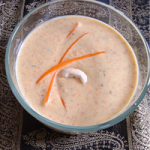
Ingredients
- 1 big carrot
- 10 -15 cashews
- 3 teaspoons sugar
- 250 ml milk (boiled and cooled)
Instructions
- Peel carrot and cut small pieces,
- Take a bowl , pour nearly 50ml milk, add carrot pieces ,cashews and sugar, cook it till the raw smell of carrots is no more.
- Allow to cool it.
- Take Mixer Jar (big one which usually used making juices), add cooked carrots and cashews in, it, run mixie for few minutes, so that it becomes soft, add rest of milk, run the mixie for 5 – 10 mins depending. Carrots and cashew milk ready. Staight away serve or Cool it(leave in it fridge for atleast an hr) and Serve chill.
- Ideal for school children, when they are back from school. Healthy Drink !
Other Facts
- Cashew milk is completely devoid of lactose, so drinking it won’t leave you with nausea, vomiting, abdominal cramping, flatulence (excess gas), and diarrhea if you suffer from lactose intolerance.
- It is also low in fat and calories, which makes it a wonderful milk replacement if you are trying to shed off unwanted pounds.
- Because it is often fortified with vitamins and minerals, cashew milk is just as good as cow’s milk in optimizing your health.
- Unlike cow’s milk, cashew milk has no naturally occurring sugars, so it won’t send your blood sugar into a spike.
- A cup contains 50% of your daily Vitamin E needs (that’s even more than almond milk), which is good for your skin and helps protect against sun damage.
- A mug of cashew milk before bed will increase serotonin levels to help you go to sleep.
Comments
comments


